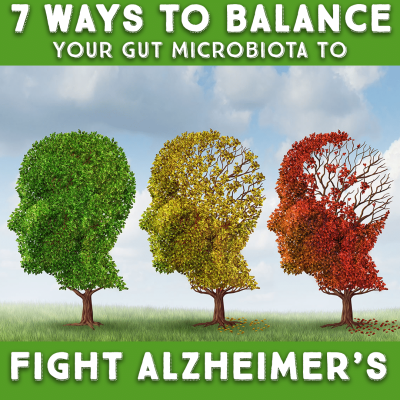7 Ways to Balance Your Gut Microbiota to Fight Alzheimer’s

Over 5 million Americans suffer from the most common form of dementia – Alzheimer’s Disease. This means there is a very high chance you or a loved one might be battling this disease.
The hallmark sign of Alzheimer’s is the beta-amyloid plaques, protein fragments, that form on the neurons of the brain. These proteins affect neuron communications of the brain, which affects all bodily functions.
In a healthy brain, these protein fragments are broken down and eliminated by the immune cells in your brain, called the microglia.
Previous research has been focused on our central nervous system since Alzheimer’s affects your brain.
However, our body is composed of multiple systems which all either directly or indirectly influence the other systems functions.
Our body is like a well-oiled machine – until there’s a rusted part that alters the machine’s performance.
When scientists started to look beyond the central nervous system as to what might be causing Alzheimer’s, they started to recognize how our gut microbiome impacted all systems of our body.
These fairly recent studies might have unlocked the door finally finding solutions for this mysterious disease.
What is Your Gut Microbiota?
Your body hosts a complex ecosystem of microbes – the most common being bacteria, viruses, and fungi. Specifically, your gut’s microbiota is the population of microbes living in your intestines.
Almost 100 trillion microorganisms – mostly composed of bacteria – thrive in your gastrointestinal tract.
There’s a give-and-take relationship between your gut microbiota and your body. The bacteria has a positive effect on your body’s physiological function, while your gut provides them with a perfect environment to thrive.
Your gut microbiome – the genetic makeup of all the microbes in your gut– contains 150 times more genes than the human genome. This is why scientists have nicknamed the gut “the second brain.”
Your gut’s microbiota plays a vital role in your body’s health, which include:
- Modulating your immune system
- Helping to digest food properly
- Producing vitamins A & K
- Protecting against pathogen overgrowth
- Extracting energy from certain foods
You can imagine if you have an imbalance in your gut’s environment, your bacteria isn’t going to be too happy – and this can have a direct impact on your health.
The Gut-Brain Connection in Alzheimer’s
A recent study by Dr. Hållenius at the Lund University found a direct connection between the gut microbiota and the mind.
The study found that Alzheimer’s mice had an alarming decrease in diversity of gut bacteria compared to healthy mice. And after transferring intestinal bacteria from Alzheimer’s mice to germ-free mice, there was a noticeable increase in beta-amyloid plaque in the brain.
Over 80% of your immune system exists in your gut microbiome.
So how are the bacteria in your gut microbiota directly affecting the brain?
When the health of your immune system through gut bacteria is disrupted – your body’s defense system starts to break down. And when your gut bacteria is not in tip-top shape they can’t carry out all of their vital tasks either.
Just like going to work after a sleepless night, it’s difficult to complete your job’s task at your best.
Microglia are the immune cells in your brain, but they can be thrown off by poor gut health. This means they aren’t able to perform one of their fundamental jobs – breaking down the amyloid-beta plaques forming on your brain leading to Alzheimer’s.
Your gut microbiome is directly connected to your immune system functioning properly – so how do you keep your bacteria balanced?
Here are 8 Ways to Balance Your Gut Microbiota and Fight Alzheimer’s
- Eliminate sugars – Just like us humans love sugar – bad bacteria does too. Sugar acts as a feeding ground for bad bacteria, contributing to its overgrowth. It also suppresses the growth of your good bacteria – throwing your gut into a bacterial imbalance.

- Eat vegetables, fruits, and complex carbohydrates – Studies show that those consuming a plant-based diet compared to the typical Western diet have a higher biodiversity of bacteria in their fecal matter. Load up on fruits, vegetables, and complex carbohydrates and leave the processed, fried foods in the trash.
- Consume healthy fats – Olive oil, avocados, nut oil, grapeseed oil and coconut oil have all been proven to decrease the risk of cognitive decline. Getting your omega 3 fatty acids is important for your brain since these have been shown to lower beta-amyloid levels in your blood and help prevent Alzheimer’s disease.
- Atrantil – Atrantil’s natural ingredients help balance your gut microbiome by reducing unwanted bacteria, which helps provide homeostasis in the gut. Atrantil is a great prebiotic to help nourish the gut microbiome and protect the good bacteria in your small intestine.
- Avoid antibiotics – Of course, there are times when we need to take antibiotics because of a certain illnesses. But nowadays doctors seem to be prescribing antibiotics for something as simple as a common cold. Antibiotics are known to cause dysbiosis, imbalance of gut bacteria, and kill not only your “bad” bacteria but the “good” bacteria as well. Only take antibiotics when needed.
- Exercise – Getting your sweat on has been proven to enrich the biodiversity in your gut, which positively affects the signaling of the gut-brain axis.
- Sleep – Sleep deprivation interferes with proper gut bacteria balance and compromises your immune system. Developing a routine sleep schedule is important in catering to your gut bacteria to prevent Alzheimer’s
An unhealthy gut means an unhealthy you.
What we feed our gut contributes to the composition of the community of our gut microbiome.
More and more research has proven that your gut microbiota has a direct impact on our health – feeding it the best nutrients is important for our cognitive function. You can support your brain by supporting your gut.